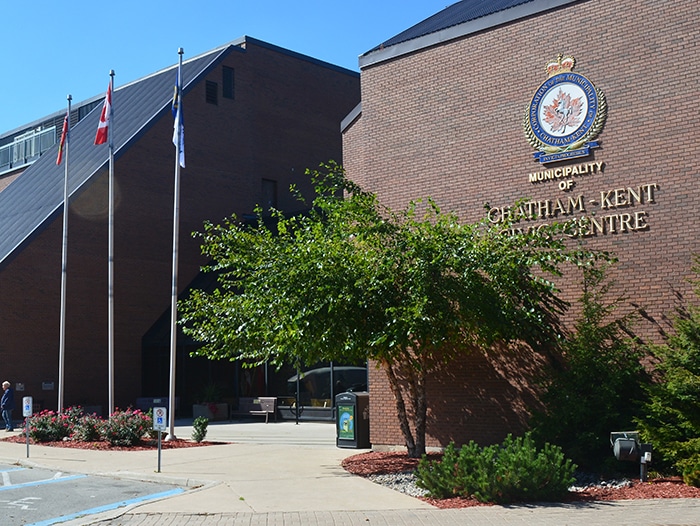State of Housing and Homelessness in C-K addressed in report
Jenna Cocullo, Local Journalism Initiative

Chatham-Kent is taking steps to address social issues throughout the municipality.
At the last council meeting, West Kent Coun. Melissa Harrigan successfully brought forward a motion to create a task force to understand the human, social, and community impacts of COVID-19.
The motion requested that the municipality work with the United Way of Chatham-Kent and local stakeholders to present a report to council on ways to mitigate the effects of COVID-19. The report will include the perspectives of residents that have missed health care visits, (ex. missed childhood immunizations, seniors with multiple chronic diseases), the mental and emotional toll of COVID-19, and the impact on the homeless and other groups of vulnerable people.
“I am trying to get a report forward that really does the same thing (as the economic recovery task force) but for a human and social and community recovery. That way, when we see government opportunities for funding or making decisions on what it is we’re going to spend tax dollars on, we have a whole picture as a council,” she said.
Harrigan said many community organizations have changed their approach in the way they have been providing services during the pandemic, and gaps need to be addressed.
Mental health is one of the biggest priorities needing to be addressed for Harrigan after hearing many stories from her constituents about their struggles and gaps in support. However, Harrigan noted that an intersectionality of gender and race-based issues have to be addressed as well.
READ MORE: Serious mental health issues on the rise in C-K
“But that being said, there’s a lot of intersectionality that happens. Oftentimes a person’s mental health and the resources that they’re able to get are tied to their socioeconomic status or their experiences as an individual who’s gendered or racialized. In a systemic way that brings more challenges for an individual in terms of their ability to access services in response to COVID,” she said.
Since the pandemic Chatham-Kent has seen an increased number of emergency room visits and emergency service (EMS) calls related to opioid overdoses.
During the pandemic it was found that racialized neighbourhoods in Ontario had three times higher rates of COVID-19 infections, four times higher rates of hospital and ICU admissions, and two times higher death rates, prompting CK Public Health to declare racism a public health issue.
According to the Chatham-Kent Police Services, from March 13 – April 2, during the height of the pandemic, there was a 52 per cent increase in domestic-related calls from the same time last year. Police responses to family disputes rose by eight per cent.
READ MORE: C-K Board of Health declares racism public health issue
“It is no surprise that we’ve seen an increase in domestic-related calls and family disputes during this COVID-19 pandemic. As stressors such as job losses and financial pressures increase, so does the risk that someone may be abused while at home in isolation. This goes for both victims of domestic violence and children suffering from abuse at the hands of their caregivers. For some, they’ve relied on work and/or schools as a safe place and now everyone has been asked to stay home,” said Const. Renee Cowell, public information officer, adding a reminder that services are still open for those experiencing abuse.
Harrigan said recommendations in the report might look like a grant program similar to that created from the Economic Recovery Task Force suggestions, the creation of a new social program, or it could be that the municipality needs to lobby on behalf of local groups for different types of funding structures from senior levels of government.
Meanwhile, Chantal Perry, program manager, Employment and Social Services, presented the homelessness registry report, which took place last year, acknowledging the landscape changed since the COVID-19 pandemic.
A separate report regarding the isolation shelter, set up to safely manage homelessness during the pandemic, will be provided at a later date.
READ MORE: EMS calls for opioid overdoses nearly doubled in May
The original plan laid the foundation for the next five years in dealing with housing. During the previous five years a decrease in vacancy rates and increasing average rents was noted as a trend.
Before the pandemic it was estimated that 290 people experienced homelessness in Chatham-Kent in the past year, more than half of which were designated as experiencing chronic homelessness (an individual experiencing homeless for at least six months per year.)
It was estimated that 5,258 renter households cannot afford the average apartment rent from 2018 data. Roughly half of those are in need of affordable housing.
“These households were living in housing that is unsuitable, inadequate, or unaffordable, not receiving rental assistance that is geared to their income and cannot afford the average market rent,” read the report.
During the consultations people with mental illness, addiction, developmental and physical disabilities, Indigenous peoples, youth, seniors and low-income individuals were identified as demographics which need the most support.
Increasing rapid rehousing initiatives, collaborating with community stakeholders in health, justice, child welfare and social services, engaging the private sector in maintaining and creating new affordable, accessible housing, and leveraging support and funding opportunities from all levels of government and advocacy partners were among some of the recommendations moving forward.
READ MORE: C-K joins national initiative to end homelessness






